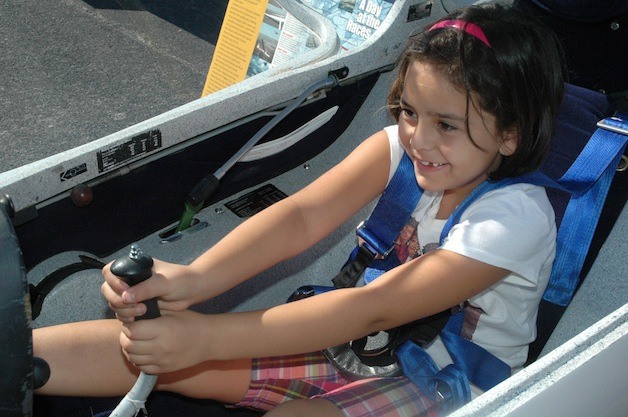ARLINGTON — It was 7-year-old Aidan Rork’s second time at one of the Arlington Airport’s Appreciation Days, but it was his first time getting to go up in a light-sport aircraft.
“The last time we came here, the flights were rained out,” said Todd Rork, Aidan’s dad, who works construction at Paine Field. “He really enjoyed going up this time, though. It’s good to get kids interested in aviation.”
Aidan was as impressed by the speed of his flight as by its destination, which allowed him to catch sight of the Oso slide area.
“I didn’t know it was that big,” Aidan said of the slide area. “We were going really fast.”
Aidan was one of 97 children who received their first airplane rides from the 13 volunteer pilots at the Sept. 20 event, which received several hundred visitors.
New Airport Manager Dave Ryan reported that some cloud cover at 9 a.m. gave way to completely clear skies by 11 a.m., which helped draw enough attendees to push back the event’s scheduled wrap-up from 2 to 4 p.m.
“The kids got to go on Young Eagles flights, and they loved the flight simulators,” Ryan said. “We even had historic aircraft like the Lockheed Electra, which you don’t see a lot of anymore.”
Although Airlift Northwest pilot “Lucky” Mertes and his flight nurses were only able to stay for 45 minutes before they had to respond to an emergency call, they were mobbed with as many as 75 onlookers of all ages, many of whom were able to strap themselves into the helicopter’s seats.
“It was a great turnout for as little time as we were able to stay,” Mertes said. “The kids always want to know what all of the switches do, and how the helicopter flies. The adults are more interested in how we respond to medical situations.”
While Mertes hopes he never has to see any of the children from the event on a medical call, he believes that meeting with them might reassure them during emergencies.
“By familiarizing them with our aircraft and procedures, it could make them more comfortable flying with us if we need to pick them up,” Mertes said.







